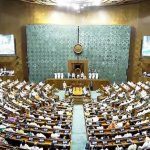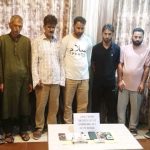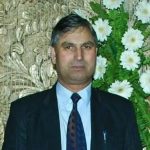Vocational education has emerged as a crucial pillar of modern learning, bridging the gap between academic knowledge and real-world skills. Unlike traditional education, which often focuses on theoretical understanding, vocational training equips students with practical expertise tailored to specific industries. From healthcare and technology to entrepreneurship, it empowers young individuals to step confidently into the job market or start their ventures, meeting the demands of a rapidly evolving world. For students in remote and underprivileged areas, vocational education is more than just a course—it’s a lifeline. It offers them the tools to overcome socio-economic barriers, ensuring they are not left behind in the race for opportunity. BHSS Uri, a school located in the scenic border town of Uri, is a shining example of how vocational training can transform lives and create pathways to success.
In the heart of Uri, located in the lap of beautiful mountains and the gentle flow of the Jhelum River Govt. Boys Higher Secondary School Uri is taking lead in imparting skill education and training the young budding talents for their future. The institution being one among the oldest educational institutes in Uri sub division caters a large population to meet the educational demands of the student community. The institution has always stood at forefront for the upliftment of educational standards in the locality. Students from far-flung villages like Charunda, Batgran, Gowalta, Kamalkote, Chakra, Dulanja, Gowhalan, Nambla, Dardkote, Silikote, Nawarunda, Hathlanga, Sahoora etc come long way to this school for their education. Most of these villages are on / near the border with limited access to all the facilities, resources and opportunities. However, a couple of higher secondary schools have been opened in the outskirts of Uri also in order to lessen the burden on town Higher Secondary Schools and to ease the sufferings of student community.
Living in a border region comes with its own set of challenges. Employment opportunities are scarce, resources are limited, and the socio-economic constraints often hinder young people from exploring their full potential. Traditional academic routes, though important, rarely address the practical needs of these students. Besides obtaining academic qualifications, maximum numbers of students are not adjusted in the job market due to increased demand of skill education in the current scenario. Introduction of vocational training has changed this narrative. It equips students with hands-on skills that are directly aligned with industry needs, opening doors to stable careers and entrepreneurial ventures. It’s not just education—it’s empowerment.
BHSS Uri has embraced this challenge with open arms. The school’s vocational education program has become a model of success, particularly in healthcare, has become a beacon of hope. Its modern healthcare lab, buzzing with activity, provides students with the chance to learn essential medical practices through real-life simulations and practical lessons. BHSS Uri is leading this charge with a state-of-the-art healthcare lab, buzzing with activity, allow students to learn essential medical practices in a professional environment. At Govt. Boys Higher Secondary School (BHSS) Uri, vocational education is not just part of the curriculum—it’s a lifeline for students navigating the unique challenges of life in a border area.
To ensure students gain real clinical exposure, they are regularly sent to Sub-District Hospital (SDH) Uri for training and orientation, where they work alongside experienced healthcare professionals, learning critical skills like patient care, emergency response, and hospital operations. Besides this Industrial Exposure Visits to Govt Medical College Baramulla are also being conducted from time to time in order to orient the students. These experiences don’t just sharpen their technical abilities—they give students the confidence to handle real-life challenges with poise and determination. “Being at SDH Uri has taught me so much,” shares one student. “It’s one thing to learn in a classroom, but working with patients and doctors makes everything come alive,” shares another.
It’s about more than just jobs. It’s about giving our students a sense of purpose and the tools they need to build a better life for themselves and their families. Programs like those at BHSS Uri are not just about preparing students for local opportunities—they’re about making them competitive. The success of vocational education at BHSS Uri sends a powerful message: with the right support, schools can transform even the most remote regions into hubs of talent and opportunity. However, this transformation requires collective effort. Policymakers, educators, and the community must come together to prioritise vocational education, regularise its framework, and ensure every student gets the chance to dream big.
Besides healthcare subject, Information Technology (IT) is also being taught to the students at BHSS Uri and a good number of students are obtaining their education in this field also. Information Technology being one of the demanding subjects in the job market remains always on the priority list of the candidates. Various success stories of the students of BHSS Uri receiving vocational training in Healthcare and IT sector have become the inspiration for other students to take-up this course alongside their formal education.
BHSS Uri’s success shows what’s possible when education adapts to meet real-world needs. By combining academic learning with practical skills and real-life exposure, the school is not only preparing students for jobs but also equipping them to lead and innovate. Institutions with vocational education have become centre of excellence and priority for students for their enrolment. Vocational education is not just a subject—it’s a lifeline for the youth of this border region, offering them a chance to dream big and shape their own futures. If we want to prepare our students for the global stage, we must first support the people who train them.
(Author is a nursing scholar from Nambla Uri. Feedback: [email protected])










